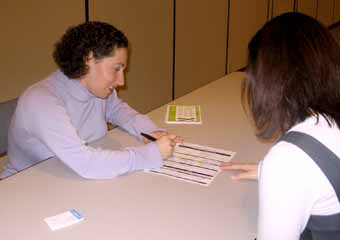You’ve Got Your Mother’s Eyes … But What Else?
Permanent link All Posts

No matter who your partner is, it’s important to get yourself tested for genetic disorders
It’s easy to look in the mirror and see your aunt Sophie’s hair or your uncle Archie’s nose. But there are other traits you could have inherited from your family that may not be so obvious — luckily, there’s lots of information available about Jewish genetic disorders and tests to help you figure out what you might be dealing with. Getting tested is an important part of taking care of your health, and is especially important if you are considering having children.
You’ve probably heard of Tay-Sachs disease, an enzyme deficiency which results in progressive brain deterioration and shortened lifespan. And perhaps you’re also familiar with cystic fibrosis, which causes the body to produce thick, sticky mucus that causes problems in the digestive system and lungs. But there are at least 11 Jewish genetic disorders for which testing is available.
Why You Should Get Tested
Getting tested is important even if you don’t have a family history. These disorders are recessive, so in order to have an affected child, both parents must be carriers. There could be a long history of carriers in your family that no one knows about, because so far, none of these carriers have had children with other carriers. And carriers are healthy, so the only way to find out if you are one, before having an affected child, is to be tested.
If your parents were tested back in the 1970s, that’s great. But, like most technologies from the 1970s, genetic testing has come a long, long way. Most of today’s tests have only been available for 10-15 years.
And having a non-Ashkenazi partner won’t get you out of it either. Whether your partner is Sephardic, a convert, or just not Jewish, there is still a risk of having a child with one of these disorders. Individuals without Ashkenazi ancestry can be carriers, though it is less likely. If you’re the ethnically Ashkenazi partner in a mixed relationship, you should consider getting tested first. Then, if you’re a carrier, your partner can get screened for all the possible mutations that could cause that particular disorder.

Want to know more? Schedule a counseling session with a genetic counselor
Take Control
Despite her best intentions, your doctor might not tell you about these tests. She may not know you’re planning on starting a family soon, or that you’re Ashkenazi. But having this information before you start trying to conceive allows you to have the widest range of reproductive options. Be proactive and ask your doctor for genetic testing. Be aware, however, that:
- Screening is very expensive, usually between $3,000-$4,000! And your insurance company may not cover this testing in full, if at all.
- Screening entails just a simple blood test. After your screening, be sure to keep your results so that you know what you were tested for in case new tests become available.
- Not all communities offer affordable screening options — but you’re in luck! You can get screened in Chicago through the JUF. Through a grant from the Jewish Federation of Metropolitan Chicago, you can get screened by the Chicago Center for Jewish Genetic Disorders for only $90. Visit the Center for upcoming screening dates and program information.
The Chicago Center for Jewish Genetic Disorders is a cooperative effort of the Jewish United Fund/Jewish Federation of Metropolitan Chicago and Children’s Memorial Hospital. The Center is a support foundation of the Jewish Federation of Metropolitan Chicago and is funded in part by the Michael Reese Health Trust.
Rachel Sacks is the Community Outreach Coordinator for the Chicago Center for Jewish Genetic Disorders, which provides public and professional education about Jewish genetic disorders and genetic mutations associated with hereditary cancers. Read more about the Center at
www.jewishgeneticscenter.org
.



.jpg)



